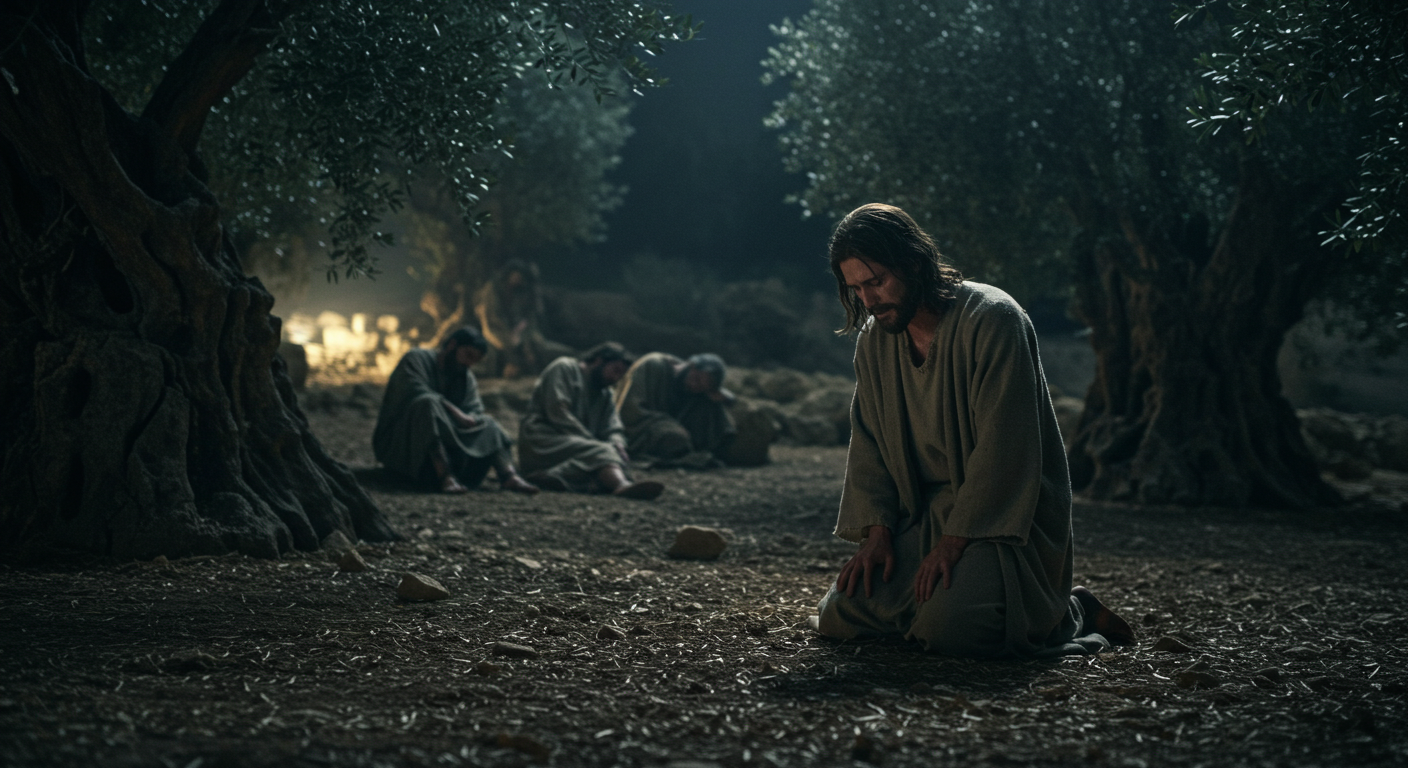Explore the emotional depth of Jesus’ prayer in Gethsemane (Matthew 26:36–46). Learn how vulnerability, submission, and persistent faith guide us in adversity.

Jesus’ Prayer in Gethsemane – Matthew 26:36–46
Introduction
Imagine, for a moment, the weight of knowing that your life is about to change most profoundly. What would you ask for? Strength, courage, perhaps a bit of peace? In one of the most poignant moments in the Bible, Jesus finds Himself confronting such circumstances. His prayer in the garden of Gethsemane is a heartfelt plea, rich with emotion and significance, making it a cornerstone for understanding prayer in times of deep distress and decision. As you journey with me through the story of Jesus’ prayer in Gethsemane, expect to uncover the historical context, dissect key elements, and learn timely lessons still relevant today. Together, we’ll explore related prayers within the Scriptures and discover practical ways to embody these principles in our own prayer lives.
Background of the Prayer
Before delving into the profound depths of this prayer, it’s vital to set the scene. Jesus’ prayer takes place in the garden of Gethsemane, shortly before His arrest and eventual crucifixion. To grasp the full weight of this moment, consider what Jesus was up against—He knew all too well what was to come, yet chose to face it head-on with faith and submission.
The garden of Gethsemane, a tranquil grove at the Mount of Olives’ base, becomes a backdrop for this intense spiritual struggle. Here, Jesus prayed with His disciples, setting the stage for one of the most intimate exchanges recorded in the New Testament. His request was simple yet profound: for the impending suffering to be taken away if possible. But above all, He submitted to God’s will. Read Matthew 26:36–46 to immerse yourself in the text.
Verse Reference:
As we look at the passage, you’ll notice the profound heartache and resolution in Jesus’ words. Consider this portion of the story, where He says, “My soul is overwhelmed with sorrow to the point of death. Stay here and keep watch with me” – Matthew 26:38.
Key Elements of the Prayer
Wonderfully complex and human, Jesus’ prayer in Gethsemane reveals several key themes that resonate deeply. The prayer can essentially be divided into these vital components:
Submission to God’s Will
When Jesus says, “Yet not as I will, but as you will,” Matthew 26:39, it is a powerful reminder of surrender. Despite His fears and the agony He felt, Jesus prioritized God’s will over His desires.
Human Vulnerability
Jesus’ acknowledgment of His sorrow drives home the very human aspect of His experience. He reveals His vulnerability, expressing the kind of raw sorrow that touches anyone facing overwhelming challenges. He pleads with His disciples to stay awake and pray with Him, underscoring His need for support—a deeply relatable human trait.
Persistent Prayer
Notably, Jesus prays multiple times throughout the night, demonstrating a continued reliance on communication with God. His persistence is a lesson in earnest, relentless faith.
Together, these elements create a portrait of Jesus’ heart and His ultimate faith in God’s plan, even when it was painful and uncertain.
Lessons We Can Learn
Jesus’ prayer in Gethsemane offers rich lessons that you can apply to your own life and spiritual practice.
Faith in Surrender
One of the standout lessons here is the importance of surrendering to a higher power. Trusting that there is a plan and a purpose beyond our understanding can help us navigate life’s toughest moments.
Vulnerability and Authenticity
Jesus shows us the strength found in vulnerability. Allowing oneself to be open and honest in prayer, expressing both hopes and fears, can cultivate a deeper relationship with God.
Continued Prayer
Jesus’ repeated prayers teach us about the power of persistence. Prayer isn’t a one-time transaction but rather an ongoing dialogue with the divine.
Incorporating these lessons brings a new perspective to facing trials, encouraging an active faith and a spirit aligned with divine will.
Similar Prayers in the Bible
The Bible contains many prayers echoing similar themes of submission, vulnerability, and divine dialogue. One such instance is Solomon’s prayer for wisdom in 1 Kings 3:9, where he asks for an understanding heart.
Another parallel can be drawn from Paul’s prayer in Philippians 4:6-7, urging believers to present their requests to God with thanksgiving.
These prayers, like Jesus’ in Gethsemane, teach us about relying on God in moments of uncertainty and seeking His will above our desires.
How to Apply This Prayer Today
Bringing the essence of Jesus’ Gethsemane prayer into your own life begins with identifying moments where you face significant tests—situations involving tough decisions, emotional turmoil, or spiritual battles.
Personal Application
In challenging times, replicate Jesus’ model by seeking God’s guidance and surrendering your will to divine wisdom. When confronting a new job, a difficult relationship, or a pivotal life choice, echo Jesus’ sentiments: “Not my will, but Yours be done.”

Community Application
For those in leadership or community roles, this prayer can guide collective decision-making. Churches facing growth, missions, or new projects can lean on the principle of seeking God’s will as the ultimate guide.
Related Bible Verses
To deepen your exploration, here are some additional references that align with the themes of Jesus’ prayer in Gethsemane:
- God’s Comfort: Psalm 94:19, is a reminder of God’s soothing presence in anxiety.
- Strength in Weakness: 2 Corinthians 12:9, where God’s grace is shown sufficient amidst weakness.
These verses support a holistic understanding of reliance on God during trials.
Closing Thoughts
Jesus’ prayer in the garden of Gethsemane remains a powerful testament to faith amid adversity. Its timeless lessons on surrender, persistence, and the strength found in vulnerability speak across generations, urging you to deepen your prayer life and align with your divine purpose.
Prayer:
“Lord, like Jesus in Gethsemane, I come to You with my fears and desires. May Your will be done in my life above all else. Grant me strength, persistence, and comfort as I trust in Your divine plan. Amen.”







